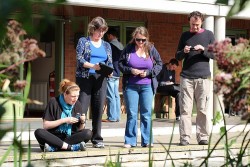Digested Read
A welcome return for an event that really should be a regular feature of the calendar. The technology has moved on in the last year and there seems to be more confidence and a sort of academic mischief-making in the air!
The full story…
I think my favourite event from 2011 was the Enhancing Fieldwork Learning Showcase in Margam, South Wales where I did a brief session on QR codes and fieldwork. More importantly, it was an event that introduced me to a whole new community of people, new ways of working and reconnected me with original discipline of geography.
This year I was invited back to talk about digital storytelling which I summed up here.
Here are some of my highlights and personal reflections from this year.
What was the same as last year? Same broad range of attendees from different disciplines and perspectives. Loads of varied presentations including giving a schools’ viewpoint on geography and fieldwork. There was the same levels of enthusiasm and fun from attendees and the organising group. The feeling of fieldwork being an intergral part of not only people’s subject areas but of their personal identities. Good food.
What was different? A greater sense of adventure, confidence and risk-taking all round. The profile of the types of technology.
Technology? Last year, one or two people had talked about using iPads but most mobile devices had been phones. This year it felt more like iPads were becoming an increasingly essential bit of fieldwork equipment (but not a panacea!).
Thats good, right? Yes. Well, sort of. There was no doubt that there’s a fantastic range of possibilities that the iPad brings from the functional to the creative and I certainly wouldn’t have been able to do my session without it. But there’s a distinct lack of alternatives out there. This left a lot of questions buzzing in my head about increasing consolidation of one ecosystem (even if it’s a good one) and the reliance on computing as consumption. All being well, in the next 5 years students arriving at universities and colleges will have benefitted from a ICT curriculum which builds skills in coding and computing as construction and creation. How can fieldwork incorporate this? Is there a place in fieldwork for Arduino or Raspberry Pi?
Who was participating? A powerful aspect of the showcase was it’s multi-discipline audience. We had Alan Parkinson from Mission:Explore encouraging us to look at fieldwork in a new and irreverent way. David Rogers of the Priory School in Portsmouth showed how a school with very limited access to outdoor space can make the most of its environment and why being a “troublemaker” can be a lot of fun AND have a measurable impact on results. Sarah Taylor from Keele University showed off the use of the Vertex IV in her research and teaching. Rick Stafford from Bedfordhsire Uni talked about using mobile devices in a citizen science project to collect biodiversity data. Judith Lock talked about the ecology work she had done based on what she had learned at last year’s event which gave a nice feeling of continuity. And Brian Whalley showed off the potential of iPads as field notebooks (with honourable mentions going to Skitch and Notability). That’s not the half of it but no doubt there will be more information on the project site shortly.
Any other ideas rattling around your head? We did a bit of horizon scanning and thought about these…
- Fieldwork as hacking. Lots of talk about the recent FSC hack day. Maybe field trips could be something similar. Identify a question or problem at a location, then have students working on how they would answer or solve the question and deciding on or designing the tools to do it.
- Multi-discipline multi-age fieldwork. Field activities tend to happen in subject areas. I remember from my time at Uni that the geographers went to Turkey and the geologists went to Norway. Why not mix it up? What happens when a geopgrapher, a geologist, a computer scientist and an artist do fieldwork together?
Sounds like the start of a really bad joke. Fair enough. But also, David’s presentation on Priory made me think that his students are geographers too, all part of the same apprenticeship continuum. Why can’t fieldwork involve a range of ages and backgrounds? Students working with professors working with local communities etc etc.
- 3D Printing. One of the FSC guys talked about the possibility of using Rep-Rap with survey data to create 3D models of landscapes, transects and the like. Imagine modelling the flow of water over a hillside you just surveyed that day and printed out.
- Technology and fieldcraft
- What will we be talking a out next year? There wasn’t much discussion of augmented reality which was interesting. Maybe that’s to do with connectivity in the field, that its readability is less than perfect or that creating AR materials can be so darn complicated. With Google Glasses and other HUD devices on the horizon what might fieldwork look like in a efw years’ time.
- Access to open data stream could be a powerful addition to fieldwork. We had a demonstration of how this might work with live river discharge data from a gauging station being displayed on an iPad as we stood on the bank of the Severn.
- Wouldn’t it be great if there was a tablet dock for hooking up environmental sensors. Something like the Alesis I/O dock but for these bad boys instead of audio.
Anything else? There was loads of stuff going on but I’d suggest following Enhancing Fieldwork Learning on Twitter and Pinterest to keep up with further reports from the event and future development.
In the meantime, as well as some of the activity from the event I took a couple of pics of the rather lovely surroundings. I’m off for a cup of tea.
